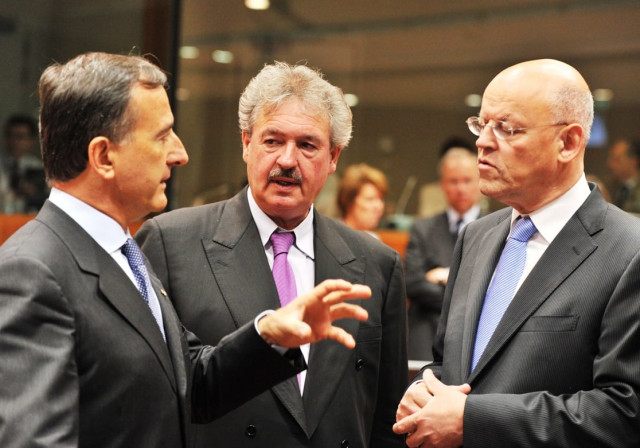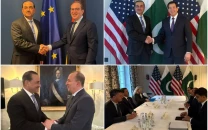EU sanctions Syria's Assad for first time
The EU condemned "the ongoing repression in Syria and the unacceptable violence" against peaceful protesters.

EU sanctions Syria's Assad for first time
European Union foreign ministers also strengthened sanctions on Iran and Libya and were to take a fresh look at the Middle East peace process in the wake of US President Barack Obama's new policy twist, as well as discuss events in Tunisia and Egypt.
As the death toll continued to climb in Syria, the 27-nation bloc condemned "in the strongest terms the ongoing repression in Syria and the unacceptable violence" against peaceful protesters.
Calling for an immediate halt to intimidation, mass arrests and torture, the ministers demanded the release of prisoners and access across the country for aid workers, medics and the press.
An EU statement also urged "without delay and through a concrete timetable, meaningful political reforms. This is the only way to initiate a peaceful transition and provide stability for Syria in the long term."
And in a final thrust, the ministers added the president, along with several leading officials, to an earlier blacklist.
"The repression in Syria continues," said British Foreign Secretary William Hague as he went into the talks.
"It is important to see the right to peaceful protest, the release of political prisoners and taking the path of reform, not repression, in Syria over the coming days."
An EU diplomat said the sanctions aimed "to stop the violence and press Assad to agree to a process of reform, but not to force him to step down."
Stepping up pressure on the Assad regime to halt weeks of relentless violence, the EU had earlier this month imposed an arms embargo as well as a visa ban and assets freeze against the president's brother, four of his cousins, and others in his inner circle.
Assad could have avoided the sanctions by listening to protesters and choosing the path of reform, said German Foreign Minister Guido Westerwelle.
"He did not choose this path. He continued to violently repress peaceful protests. This is why we must widen the sanctions, including against President Assad," Westerwelle said.
"When a regime represses its own people this way, with violence, the EU must respond."
Turning to Iran, the ministers agreed to add some 100 firms to a blacklist of companies hit by an assets freeze over Tehran's disputed nuclear programme, diplomats said.
The new restrictive measures come amid efforts to jumpstart international talks aimed at convincing Iran to halt its nuclear activities.
The EU also stepped up pressure against Libyan leader Moamer Kadhafi on Monday, widening sanctions on his regime and offering further support to insurgents based in the eastern city of Benghazi.
An EU assets freeze and travel ban against Kadhafi loyalists and firms suspected of propping up the regime was extended to a member of the Libyan leader's innner cirle and a Libyan airline, an EU diplomat said, without immediately disclosing details of those targeted.
The move came a day after the European Union officially opened an office in Benghazi -- a boost for the insurgents lobbying world powers to formally recognise their National Transitional Council (NTC).
Giving the rebels even further blessing, the ministers underlined in a statement "the important role" the NTC plays "as a key political interlocutor representing the aspirations of the Libyan people".
The words brought the EU a step closer to official recognition of the rebel body, a move long demanded by the European parliament. Up until now only Britain, France, Gambia, Italy and Qatar have recognised the NTC as their sole interlocutor in Libya.
An "important" statement is also expected in the wake of this week's landmark speech by Obama saying a Palestinian state should be set up on the basis of the lines before the 1967 Arab-Israeli war, as well as a recent unity deal between Mahmud Abbas' Palestinian Authority and its rival, Hamas.



















COMMENTS
Comments are moderated and generally will be posted if they are on-topic and not abusive.
For more information, please see our Comments FAQ